To what extent does intelligence play a role in the ability to govern an entire nation?
There is a correlation between a high IQ and effective leadership, even though having a high IQ does not ensure a person will be successful. How intelligent are the people who have served as President of the United States, and is it true that those with the highest IQ tend to be the most successful?
In earlier research carried out in 2006, Professor Dean Simonton used estimating methodologies to evaluate the President’s intelligence level. The indexes are assessed based on the biographical information and the articles written by each President when he was in office.
Since there was no information on the Presidents’ IQ, Mr. Simonton calculated an estimate based on personality attributes mentioned in biographies.
1. John Quincy Adams – The Sixth President Of The United States
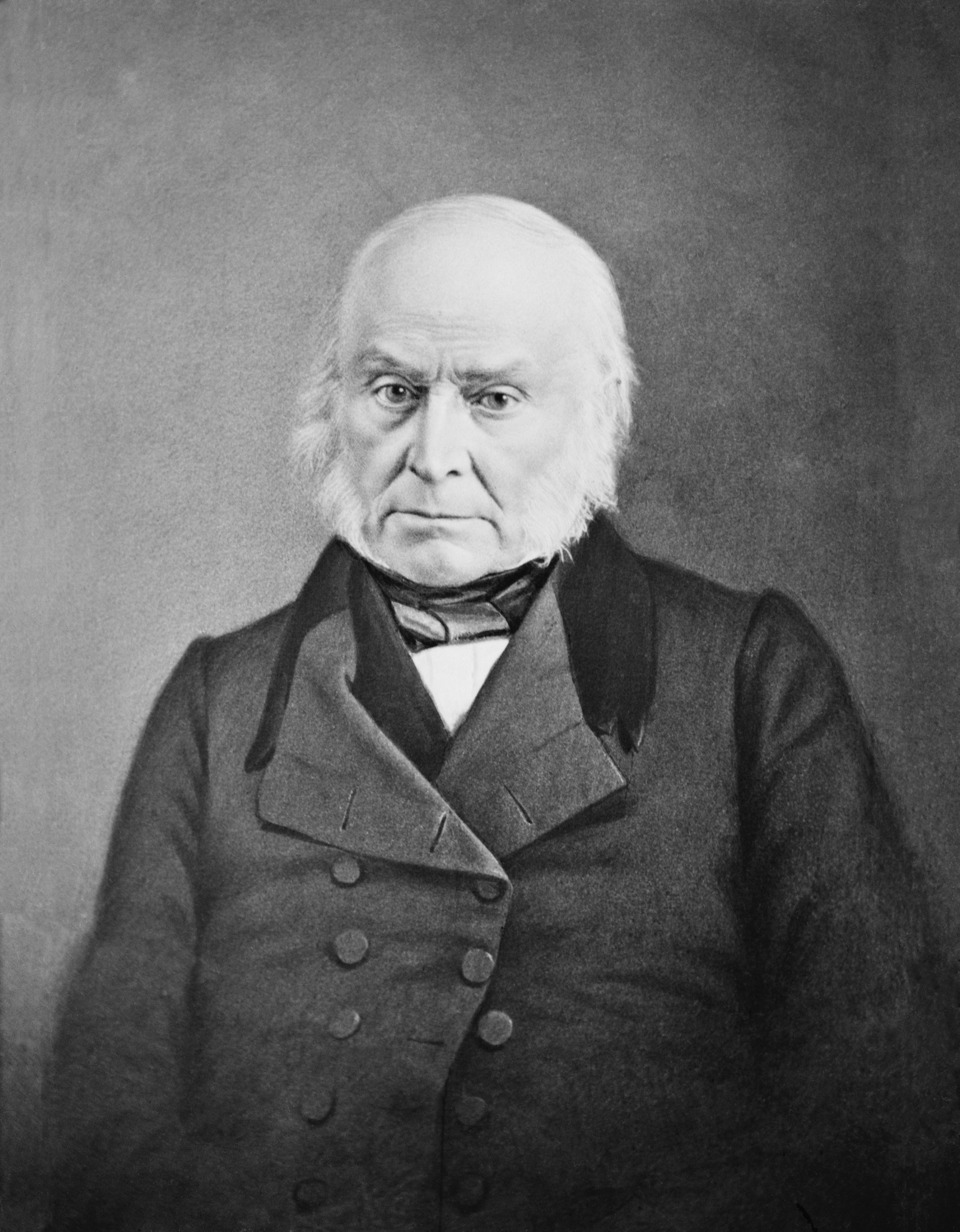
| John Quincy Adams | Information |
|---|---|
| Full Name | John Quincy Adams |
| Birthdate | July 11, 1767 |
| Birthplace | Braintree, Massachusetts, U.S. (now Quincy) |
| Parents | John Adams and Abigail Adams (née Smith) |
| Education | Harvard University (AB, AM) |
| Occupation | Politician, diplomat, lawyer, diarist |
| Presidency | 6th President of the United States (1825–1829) |
| Previous Office | 8th United States Secretary of State (1817–1825) |
| Diplomatic Posts | U.S. ambassador to the Netherlands, Russia, Prussia, and the United Kingdom |
| Family | Spouse: Louisa Johnson; Children: 4, including George, John II, and Charles |
| Notable Achievements | Negotiated the Adams–Onís Treaty, formulated the Monroe Doctrine |
| Congressional Service | Member of the U.S. House of Representatives (1831–1848) |
| Stand Against Slavery | Advocate for the rights of women, Native Americans, and abolition of slavery |
| Historical Ranking | Regarded as one of the greatest diplomats and secretaries of state, average ranking as a president |
With an IQ of 175, he came first on the list. The nickname “Old Man Eloquent” was well-deserved for the great orator John Quincy Adams. He spoke seven languages. Adam was one of the most prominent diplomats and presidents in the history of the United States. He obtained his law degree and graduated from Harvard without ever attending law school.
2. John Adams – The Second President Of The United States
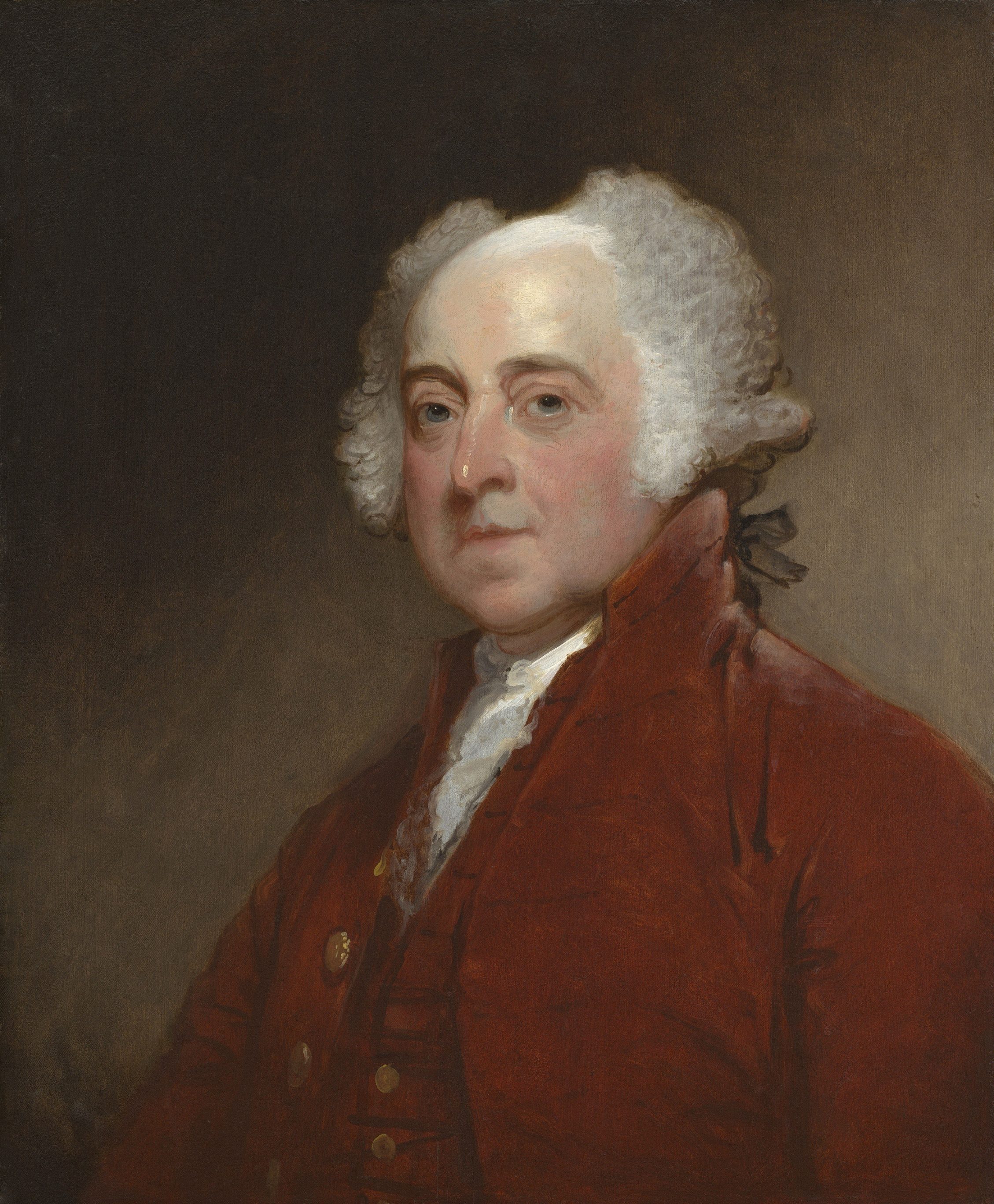
| John Adams The Second President Of The United States | Information |
|---|---|
| Full Name | John Adams – The Second President Of The United States |
| Portrait | Portrait by Gilbert Stuart, c. 1800–1815 |
| Birthdate | October 30, 1735 |
| Birthplace | Braintree, Massachusetts Bay, British America (now Quincy) |
| Occupation | Statesman, attorney, diplomat, writer, Founding Father |
| Presidency | 2nd President of the United States (1797–1801) |
| Role in American Revolution | Leader of the American Revolution |
| Vice President | Thomas Jefferson |
| Notable Achievements | – Assisted in drafting the Declaration of Independence |
| Political Party | Federalist |
| Spouse | Abigail Smith |
| Children | Abigail, John Quincy, Charles, Thomas |
| Education | Harvard College (AB, AM) |
| Notable Contributions | – Defense attorney in the Boston Massacre trial |
John Adams was the 2nd President of the United States. He served in this role from 1797 to 1801 as America’s first Vice President under George Washington. According to Simonton’s estimates, Adams’ IQ is 173.
Adams studied law at Harvard University and was a patron of the American revolution in Massachusetts, which paved the way for independence in 1776.
He is best remembered for his diplomacy. While in office, John Adams’ greatest achievement was the peaceful solution he negotiated and agreed to with the French Government to end the conflict and prevent the outbreak of a fierce war between France and the United States.
3. Thomas Jefferson – The Third President Of The United States

| Thomas Jefferson The Third President Of The United States | Information |
|---|---|
| Full Name | Thomas Jefferson – The Third President Of The United States |
| Birthdate | April 13, 1743 |
| Birthplace | Shadwell, Virginia, British America |
| Death | July 4, 1826 (aged 83) |
| Political Party | Democratic-Republican |
| Occupation | Statesman, diplomat, lawyer, architect, philosopher |
| Contributions | Primary author of the Declaration of Independence, third President of the United States |
| Achievements | Peaceful acquisition of the Louisiana Territory through the Louisiana Purchase, establishment of the University of Virginia |
| Notable Works | Declaration of Independence, Notes on Virginia, Jefferson’s Manual, Jefferson Bible |
| Personal Life | Married to Martha Wayles, had six children with Martha |
| Education | College of William & Mary |
| Libraries | Assembled multiple libraries throughout his life |
| Views on Slavery | Owned slaves but condemned the slave trade |
| Intellectual Pursuits | Wide-ranging interests in politics, ethics, religion, philosophy, history, and science |
| Philosophical Influences | John Locke, Francis Bacon, Isaac Newton, and other British Empiricists |
| Historical Significance | Instrumental in the establishment of the United States as a free and sovereign nation |
Between 1801 and 1809, Thomas Jefferson served as the third President of the United States. Simonton’s analysis shows he has a very high IQ of 160.
Before beginning his legal education, Thomas Jefferson received his degree from the College of William & Mary. After progressively taking on the role of heading the Republican Party, he hesitantly entered the race for the presidency of the United States.
After being elected President, one of his first acts was to reduce the very high tax on whiskey.
4. John F. Kennedy – The 35th President Of The United States
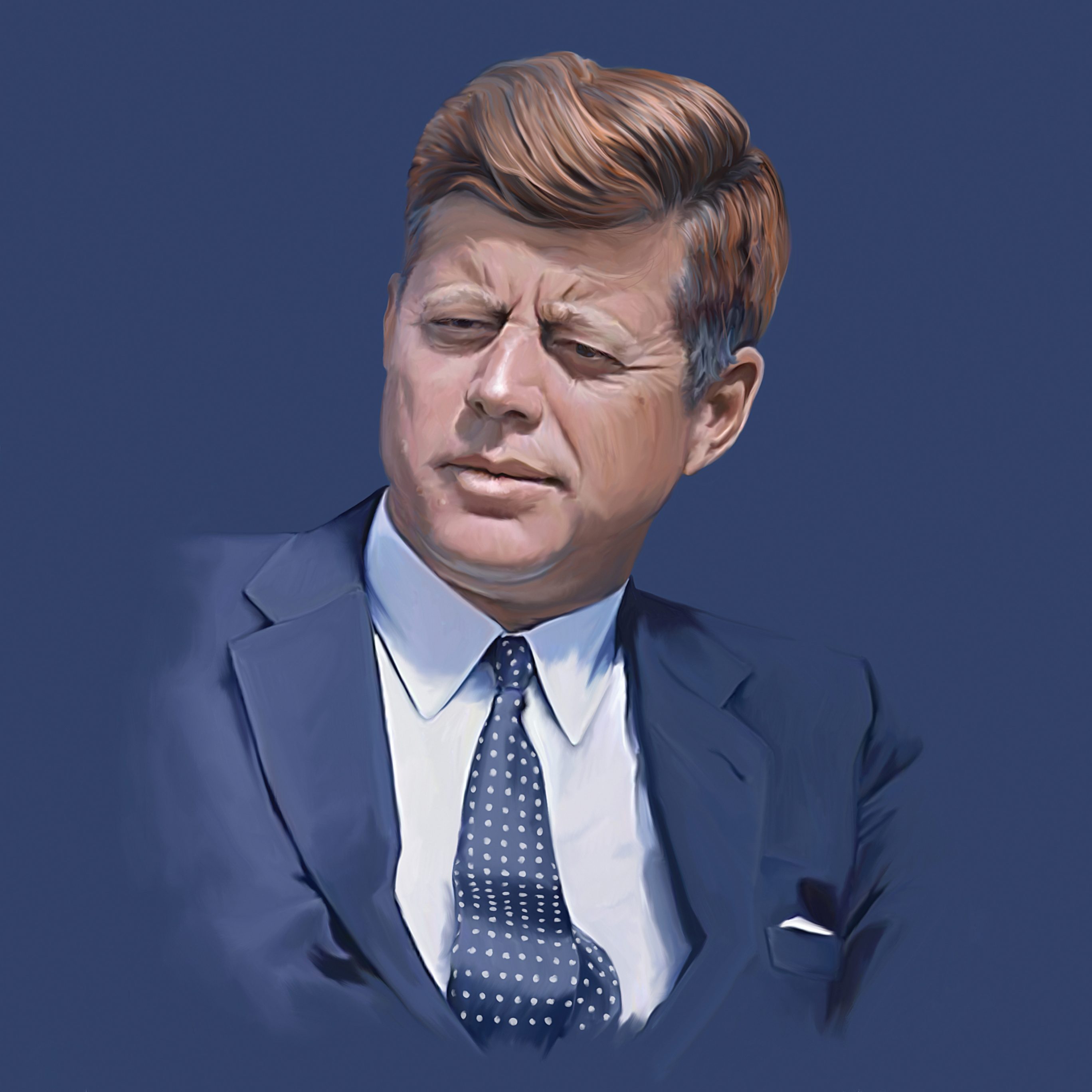
| John F Kennedy The 35th President Of The United States | Information |
|---|---|
| Full Name | John F. Kennedy – The 35th President Of The United States |
| Nickname | Jack, JFK |
| Birthdate | May 29, 1917 |
| Birthplace | Brookline, Massachusetts, U.S. |
| Education | Harvard University (AB) |
| Military Service | United States Navy |
| Political Party | Democratic |
| Presidency | January 20, 1961 – November 22, 1963 |
| Vice President | Lyndon B. Johnson |
| Achievements | – Youngest person elected President of the United States |
| Foreign Policy | – Focused on relations with the Soviet Union and Cuba |
| Assassination | November 22, 1963, in Dallas, Texas |
| Legacy | – Civil Rights Act of 1964 |
Before he was murdered in 1963, John Fitzgerald Kennedy served as the 35th President of the United States for a little over two years. He was assassinated in 1963. According to Simonton’s calculations, he had an intelligence level of 158.
After receiving his degree from Harvard University in 1940, Kennedy immediately enlisted in the navy and suffered a severe injury while serving his country in World War II.
In 1960, he won the election for the presidency. During his inaugural speech, John F. Kennedy made a renowned statement even to this day: “Do not inquire about what the nation can provide for you. Inquire about how you may assist your nation.”
5. Bill Clinton – The 42nd President Of The United States
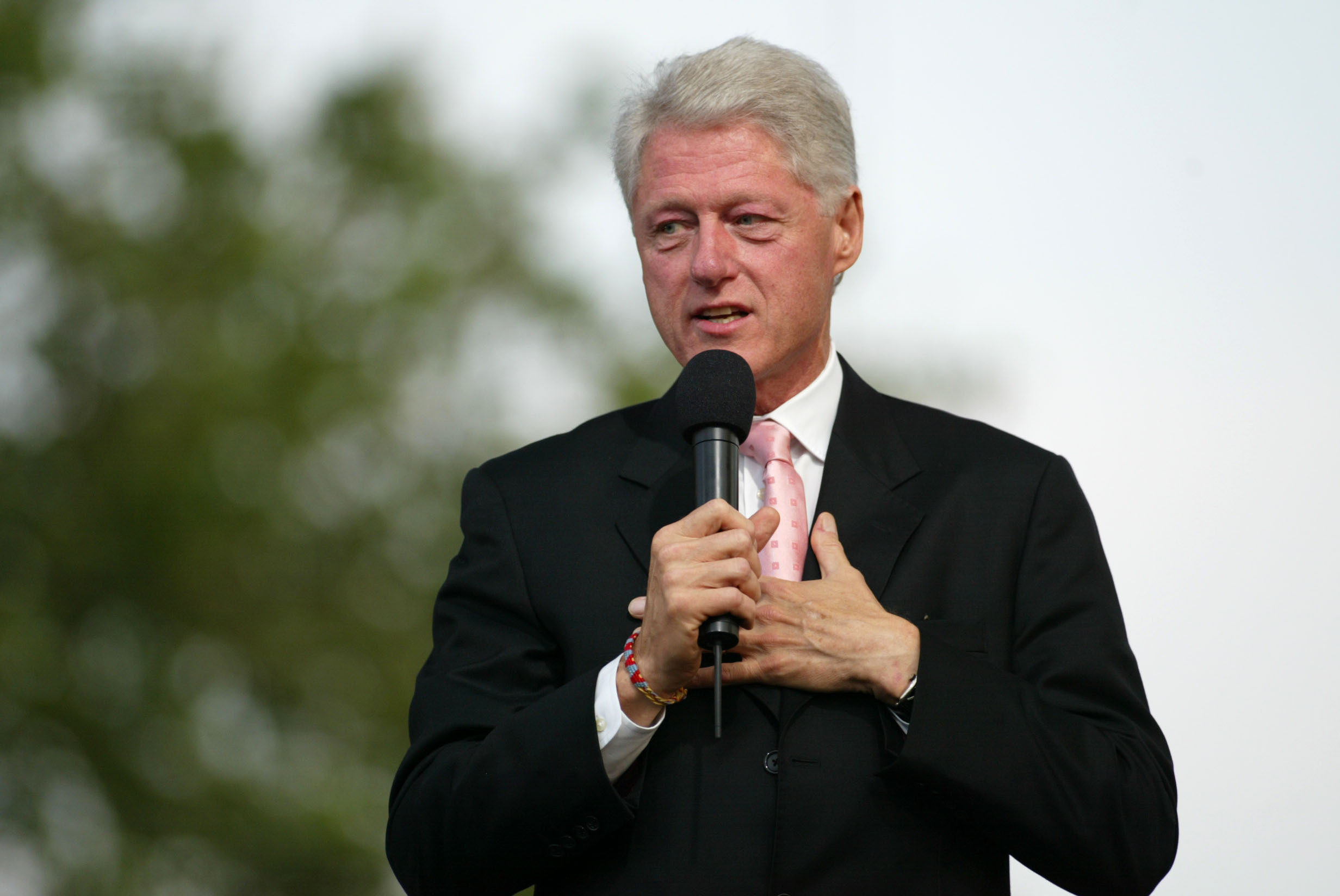
| Bill Clinton The 42nd President Of The United States | Information |
|---|---|
| Full Name | Bill Clinton – The 42nd President Of The United States |
| Birthdate | August 19, 1946 |
| Birthplace | Hope, Arkansas, U.S. |
| Political Party | Democratic |
| Spouse | Hillary Rodham (m. 1975) |
| Children | Chelsea Clinton |
| Education | Georgetown University (BS) |
| Occupation | Politician, lawyer, professor, author |
| Governor of Arkansas | 1979-1981, 1983-1992 |
| Attorney General of Arkansas | 1977-1979 |
| President of the United States | 1993-2001 |
| Vice President | Al Gore |
| Achievements | Oversaw the longest period of peacetime economic expansion in American history |
| Notable Events | Impeachment trial in the Senate following the Monica Lewinsky scandal |
Bill Clinton served as the 42nd President of the United States from 1993 to 2001. His full name is William Jefferson “Bill” Clinton. Simonton comes up with a score of 156 for his intelligence level.
Clinton was elected governor of Arkansas in 1978, four years after graduating from Georgetown University. During that time, he earned a law degree from Yale University and was awarded the Rhodes Scholarship to study at Oxford University.
After that, he was successful in his bid for president in 1992. Bill Clinton’s attempts to resolve the conflict between Ireland and the Balkans were very much appreciated by all parties involved.
6. James Madison – The Fourth President Of The United States

| James Madison Jr The Fourth President of the United States | Information |
|---|---|
| Full Name | James Madison Jr. – The Fourth President of the United States |
| Portrait | Portrait by John Vanderlyn, 1816 |
| Birthdate | March 16, 1751 |
| Birthplace | Port Conway, Colony of Virginia, British America |
| Family Background | Born into a prominent slave-owning planter family |
| Role in Founding | “Father of the Constitution” for drafting and promoting the Constitution of the United States and the Bill of Rights |
| Political Career | Member of Virginia House of Delegates, Continental Congress, and Constitutional Convention |
| Leadership Roles | Secretary of State under President Thomas Jefferson, instrumental in the Louisiana Purchase |
| Democratic-Republican Party | Co-organizer of the Democratic-Republican Party with Thomas Jefferson |
| War of 1812 | Led the United States into the War of 1812, seen as a successful “second war of independence” against Britain |
| Presidential Achievements | Created the Second Bank of the United States and enacted the protective Tariff of 1816 |
| Land Acquisitions | Native American land cessions totaling 26,000,000 acres (11,000,000 ha) under his presidency |
| Legacy | Considered one of the most important Founding Fathers, despite criticisms of his endorsement of slavery and leadership during the War of 1812 |
| Personal Life | Owned slaves and freed only one of them in 1783; retired to his plantation, Montpelier, after his presidency |
| Education | Studied at the College of New Jersey (later Princeton University) under the influence of the Enlightenment |
| Physical Characteristics | 5 ft 4 in (163 cm) tall, making him the shortest U.S. president |
| Significant Landmarks | Madison Square Garden, James Madison University, James Madison Memorial Building, USS James Madison |
James Madison is acknowledged as one of the United States Constitution’s Founding Fathers. According to Simonton’s calculations, James Madison has an intelligence level of 155.
After receiving his diploma in 1771 from the institution now known as Princeton University, Madison moved on to pursue a career in law. In collaboration with Alexander Hamilton and John Jay, he contributed significantly to ratifying the written Constitution by publishing writings on federalism and playing a leading role in developing the Federalist Papers.
In addition to co-authoring the Bill of Rights, Madison served as Secretary of State under President Thomas Jefferson when he was in office.
7. Jimmy Carter – The 39th President Of The United States

| Jimmy Carter The 39th President Of The United States | Information |
|---|---|
| Full Name | Jimmy Carter – The 39th President Of The United States |
| Birthdate | October 1, 1924 |
| Birthplace | Plains, Georgia, U.S. |
| Political Party | Democratic |
| Education | United States Naval Academy (BS) |
| Occupation | Politician, Humanitarian |
| Presidential Term | January 20, 1977 – January 20, 1981 |
| Governor of Georgia | 76th Governor of Georgia (1971-1975) |
| Georgia State Senate | Member of the Georgia State Senate (1963-1967) |
| Achievements | Nobel Peace Prize recipient (2002) |
| Major Accomplishments | Camp David Accords, Panama Canal Treaties, Strategic Arms Limitation Talks |
| Social Activism | Advocate for civil rights and opponent of racial segregation |
| Post-Presidential Contributions | Founder of the Carter Center, promoter of human rights and peace negotiations, efforts in eradicating infectious diseases |
| Books | Author of political memoirs and books on global affairs |
| Habitat for Humanity | Active participant in the nonprofit housing organization |
| Military Service | United States Navy (1946-1953) |
| Rank | Lieutenant |
| Awards | American Campaign Medal, World War II Victory Medal, China Service Medal, National Defense Service Medal |
| Longevity | Longest-lived U.S. president with the longest post-presidency |
| Public Perception | Considered an exceptional post-president, recipient of Nobel Peace Prize |
Jimmy Carter, sometimes known as James Earl Carter, was the 39th President of the United States, serving in that capacity from 1977 to 1981. In recognition of his efforts to advance human rights globally, the Nobel Peace Prize was awarded to him in 2002. According to Simonton’s calculations, his intelligence level is 153.
In 1946, Carter received his diploma from the Naval Academy, and four years later, he won the election as Governor of Georgia. After being elected President, he initiated several significant measures, including reforming the administrative structure and the national energy strategy
8. Woodrow Wilson – The 28th President Of The United States
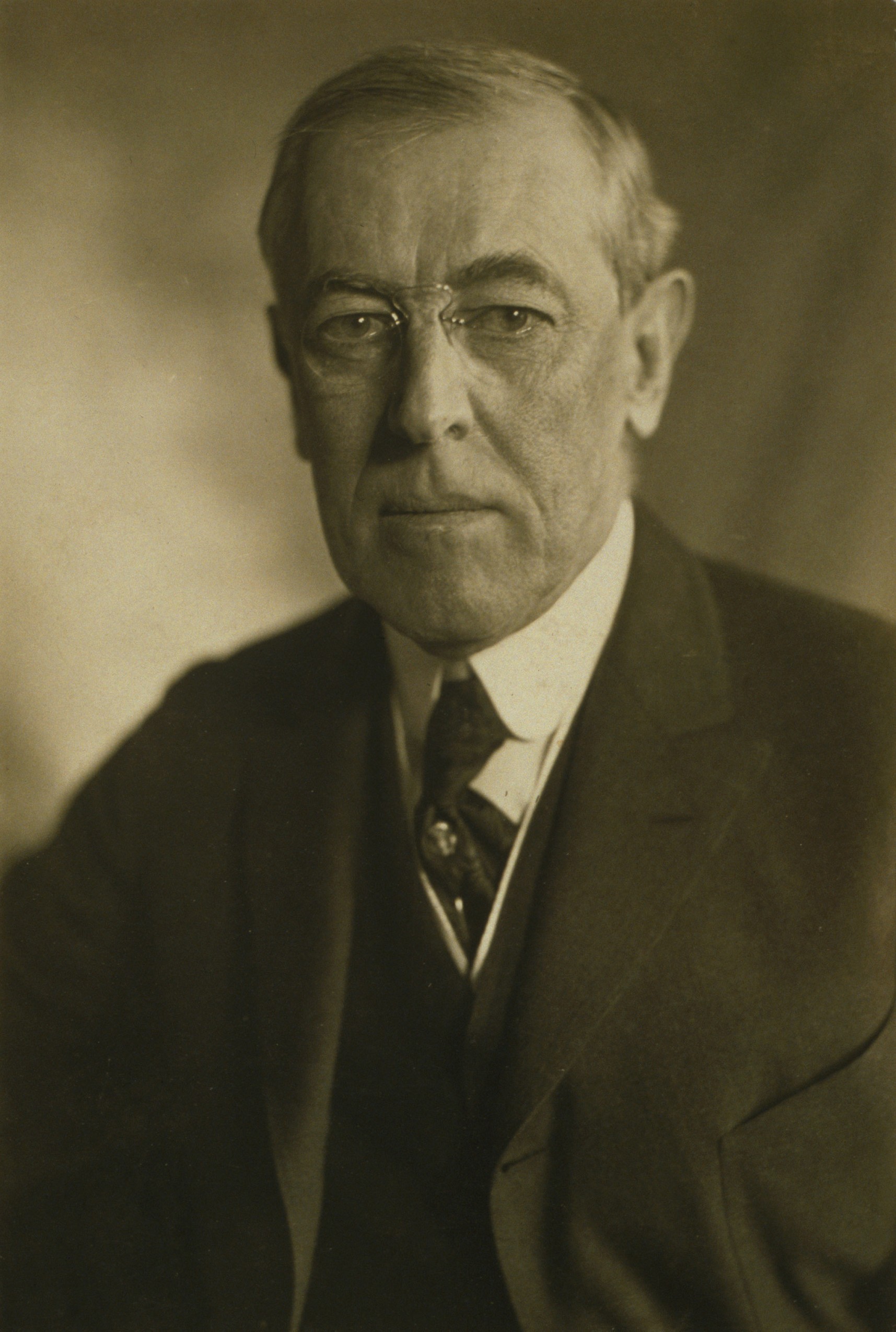
| Woodrow Wilson The 28th President of the United States | Information |
|---|---|
| Full Name | Woodrow Wilson – The 28th President of the United States |
| President of the United States | 28th President of the United States |
| In Office | March 4, 1913 – March 4, 1921 |
| Vice President | Thomas R. Marshall |
| Preceded by | William Howard Taft |
| Succeeded by | Warren G. Harding |
| Governor of New Jersey | 34th Governor of New Jersey |
| In Office | January 17, 1911 – March 1, 1913 |
| President of Princeton University | 13th President of Princeton University |
| In Office | October 25, 1902 – October 21, 1910 |
| Born | December 28, 1856 in Staunton, Virginia, U.S. |
| Died | February 3, 1924 in Washington, District of Columbia, U.S. |
| Resting Place | Washington National Cathedral |
| Political Party | Democratic |
| Spouses | Ellen Axson (m. 1885; died 1914), Edith Bolling (m. 1915) |
| Children | Margaret, Jessie, Eleanor |
| Parent | Joseph Ruggles Wilson (father) |
| Alma Mater | Princeton University (BA), Johns Hopkins University (PhD) |
| Occupation | Politician, academic |
| Awards | Nobel Peace Prize (1919) |
| Recorded Voice | Woodrow Wilson’s voice on Democratic principles |
According to Simonton, Woodrow Wilson, who served as the 28th President of the United States, is estimated to have an intelligence level of around 152. From the years 1902 and 1910, he served as president of Princeton University. He served as governor of New Jersey between 1911 and 1913.
Wilson launched his campaign for antitrust legislation soon after he was elected president, and he was successful in having the Federal Trade Commission Act signed into law in September of 1914.
9. Theodore Roosevelt – The 26th President Of The United States
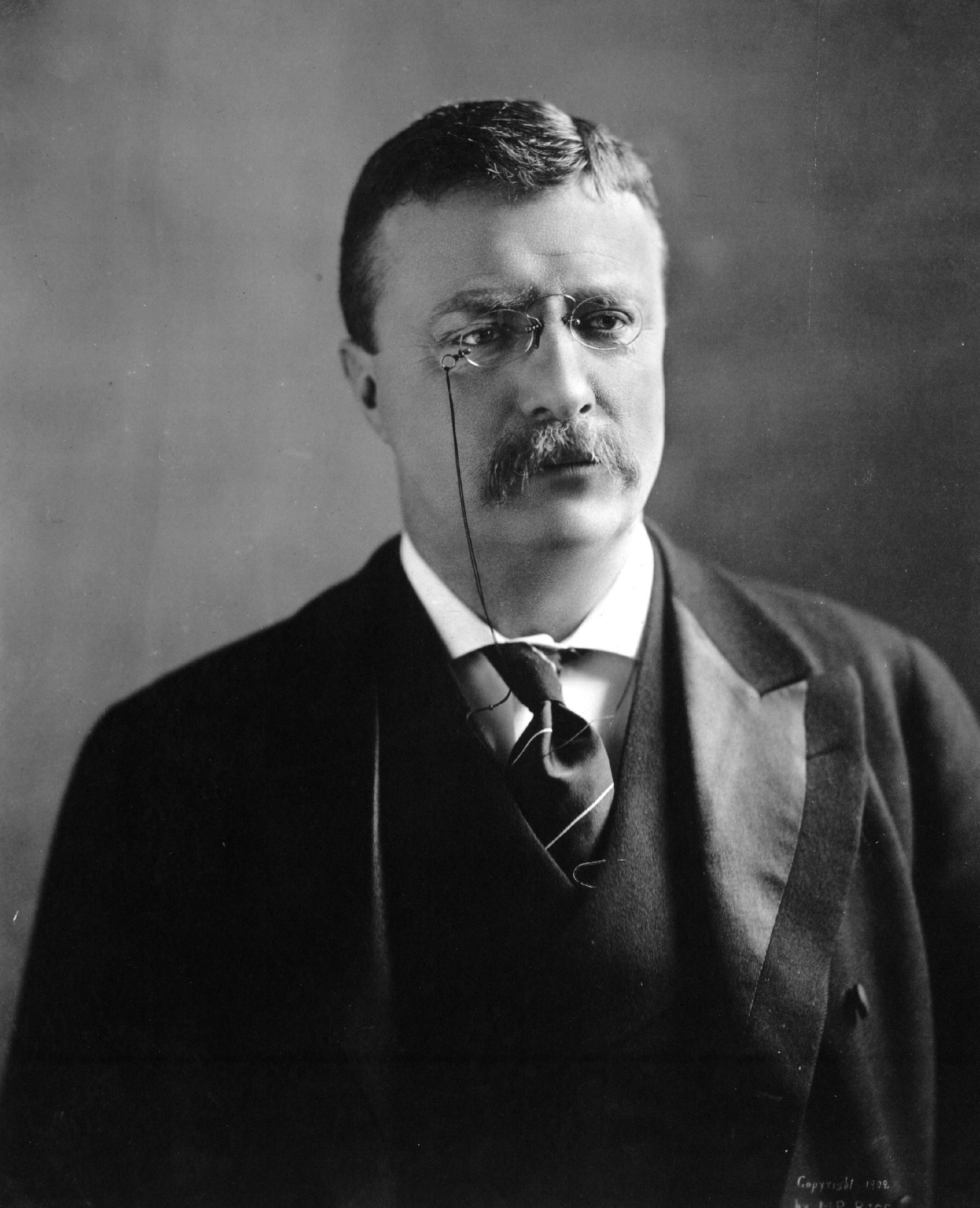
| Theodore Roosevelt The 26th President of the United States | Information |
|---|---|
| Full Name | Theodore Roosevelt – The 26th President of the United States |
| Nickname | Teddy, T. R. |
| Occupation | Politician, Statesman, Soldier, Conservationist, Naturalist, Historian, Writer |
| Presidential Term | 1901-1909 |
| Vice President | None (1901–1905); Charles W. Fairbanks (1905–1909) |
| Governor of New York | 1899-1900 |
| Birthdate | October 27, 1858 |
| Birthplace | Manhattan, New York City, New York, U.S. |
| Parents | Theodore Roosevelt Sr., Martha Stewart Bulloch |
| Siblings | Anna, Elliott, Corinne |
| Education | Harvard College (A.B. magna cum laude), Columbia Law School |
| Military Service | United States Army, Colonel (1898), Spanish–American War, Battle of Las Guasimas, Battle of San Juan Hill |
| Political Party | Republican (1880–1912, 1916–1919); Progressive “Bull Moose” (1912–1916) |
| Achievements | Nobel Peace Prize (1906), Established national parks, forests, and monuments, Initiated the construction of the Panama Canal, Great White Fleet world tour, Russo-Japanese War mediator, Advocate of Progressive policies |
| Marriages | Alice Lee (m. 1880; died 1884), Edith Carow (m. 1886) |
| Children | Alice, Theodore III, Kermit, Ethel, Archibald, Quentin |
| Death | January 6, 1919 (aged 60), Oyster Bay, New York, U.S. |
| Legacy | Ranked as one of the greatest presidents in American history |
| Notable Traits | Overcame health challenges, Exuberant personality, Robust masculinity, Strenuous lifestyle, Learned historian and popular writer, Champion of progressive and anti-trust policies |
As the 26th President of the United States, Theodore Roosevelt served that role. At 43, he holds the record for being the youngest President in the history of the United States. Simonton concluded that Roosevelt had an IQ of 149.
After receiving his degree from Harvard in 1880, he attended Columbia University to pursue a legal education but ultimately dropped out. Instead of focusing on his studies, he devoted most of his time to writing a book about the War of 1812.
10. James Garfield – The 20th President Of The United States
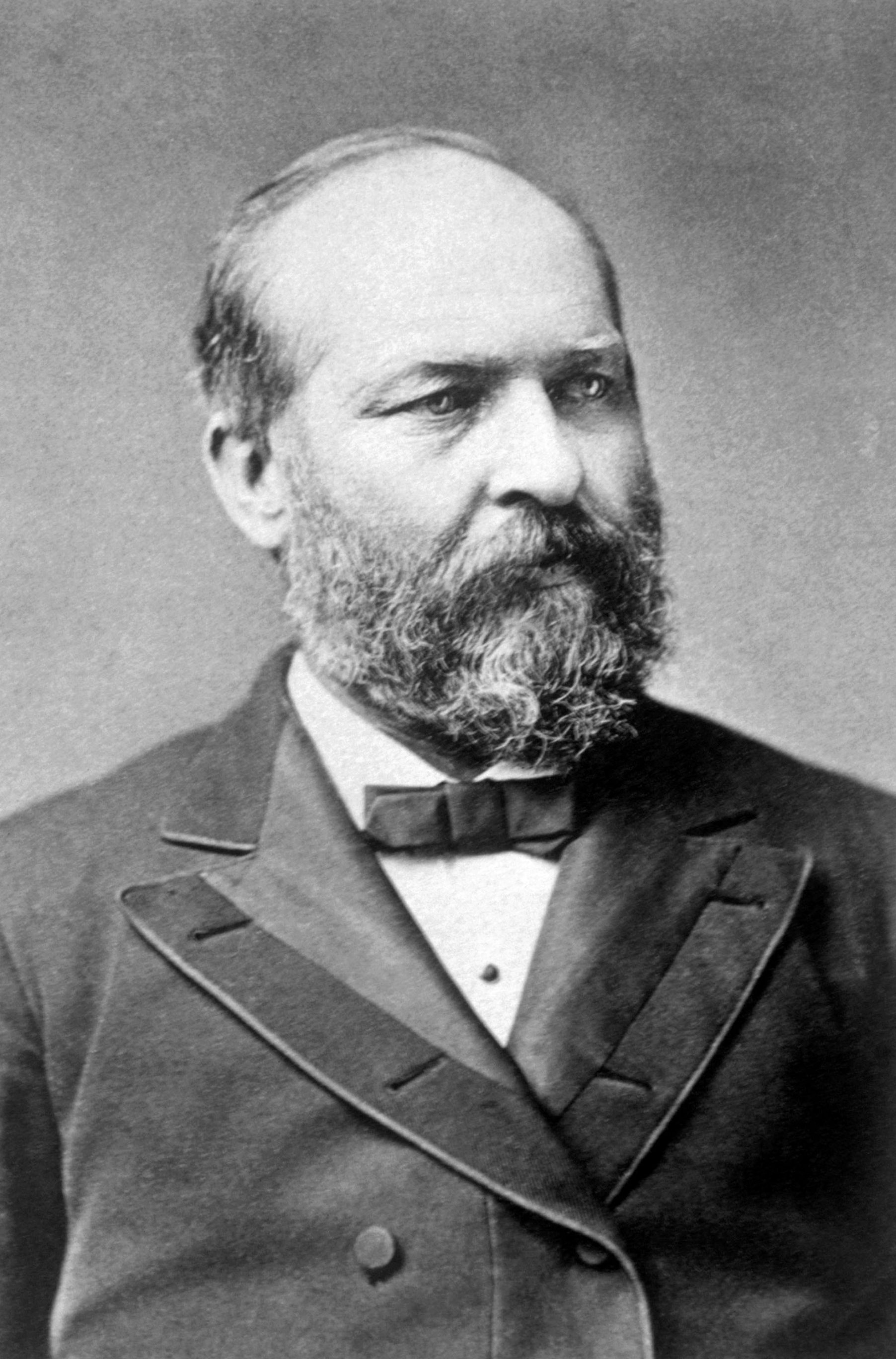
| James Abram Garfield The 20th President Of The United States | Information |
|---|---|
| Full Name | James Abram Garfield – The 20th President Of The United States |
| Presidency | 20th President of the United States |
| Term | March 4, 1881 – September 19, 1881 |
| Vice President | Chester A. Arthur |
| U.S. House Member | March 4, 1863 – November 8, 1880 |
| Chair of Committee | March 4, 1871 – March 4, 1875 |
| Ohio Senate Member | January 2, 1860 – August 21, 1861 |
| Birthdate | November 19, 1831 |
| Birthplace | Moreland Hills, Ohio, U.S. |
| Death | September 19, 1881 |
| Place of Death | Elberon, New Jersey, U.S. |
| Manner of Death | Assassination |
| Resting Place | James A. Garfield Memorial |
| Political Party | Republican |
| Spouse | Lucretia Rudolph (m. 1858) |
| Children | 7, including Hal, James, and Abram |
| Education | Hiram College, Williams College (BA) |
| Occupation | Politician, Lawyer, Amateur Mathematician |
| Military Service | United States Army |
| Years of Service | 1861 – 1863 |
| Rank | Major General |
| Commands | 42nd Ohio Volunteer Infantry, 20th Brigade, 6th Division, Army of the Ohio |
| Battles/Wars | American Civil War, Battle of Middle Creek, Battle of Shiloh, Siege of Corinth, Tullahoma Campaign, Battle of Chickamauga |
James Garfield became the 20th President of the United States in 1881, although he only served as president for a little over a year before he was killed in an assassination attempt.
Simonton’s calculations suggest that Garfield had an intelligence level of 148 when he graduated from Williams College. Despite the fact that Garfield’s term as president was relatively brief, he accomplished a great deal during his time in office, including the development of the United States Navy, the battle against corruption, and the appointment of African-Americans to significant government posts.
11. Chester Arthur – The 21st President Of The United States
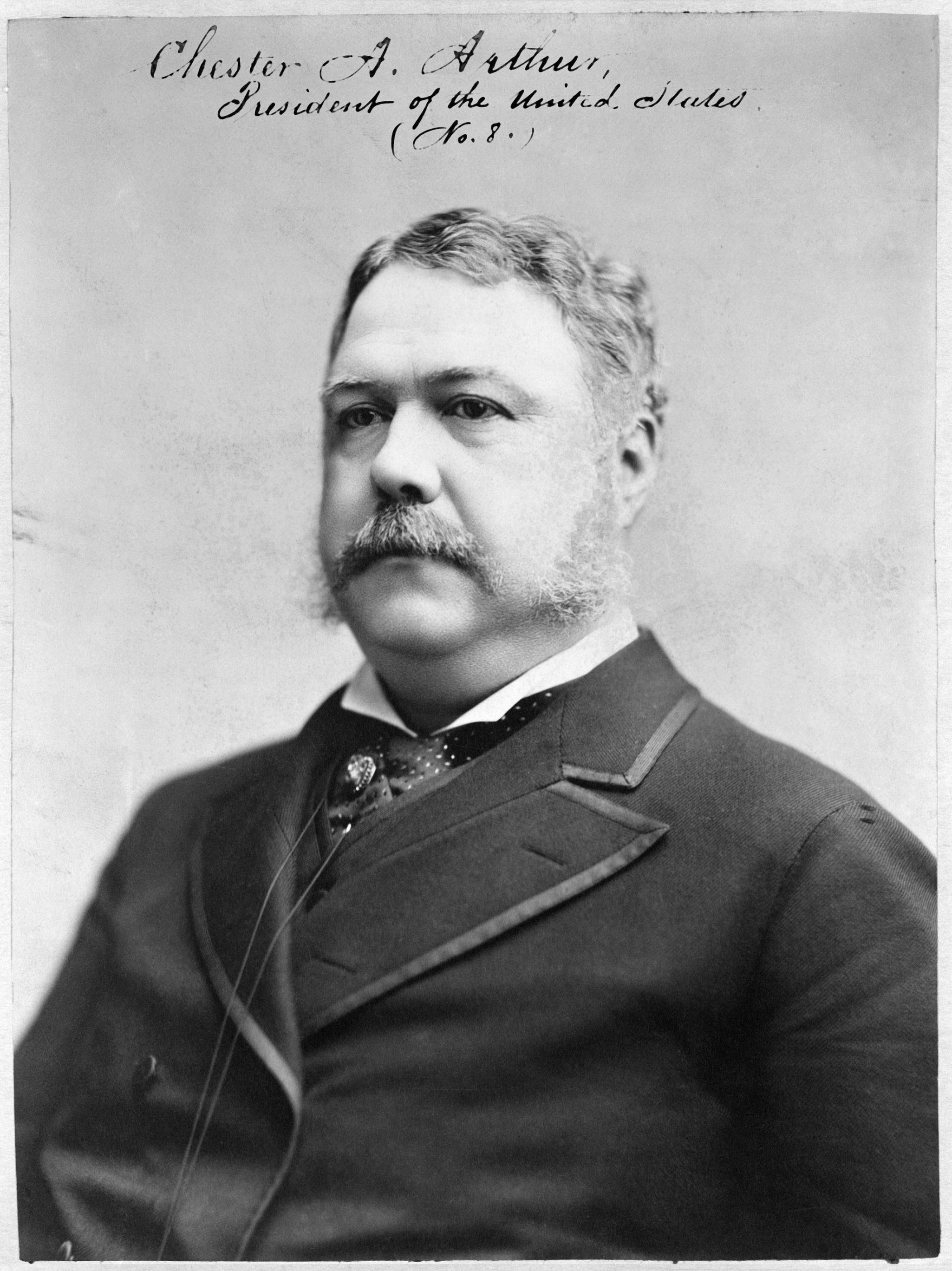
| Chester Arthur The 21st President Of The United States | Information |
|---|---|
| Full Name | Chester Arthur – The 21st President Of The United States |
| Birthdate | October 5, 1829 |
| Birthplace | Fairfield, Vermont, U.S. |
| Presidency | 21st President of the United States (1881-1885) |
| Vice President | None |
| Education | Union College (BA), State and National Law School |
| Political Party | Republican (1854–1886) |
| Spouse | Ellen Herndon (m. 1859; died 1880) |
| Children | William, Chester II, Ellen |
| Military Service | Brigadier General in the New York Militia (1857-1863) |
| Accomplishments | Served as the 20th Vice President of the United States under President James A. Garfield; assumed the presidency after Garfield’s assassination; played a key role in the rebirth of the U.S. Navy; signed the Pendleton Civil Service Reform Act of 1883; enforced the Immigration Act of 1882 and the Tariff of 1883; appointed Horace Gray and Samuel Blatchford to the Supreme Court; supported desegregation of New York City streetcar lines |
| Legacy | Recognized for his solid performance in office; praised for diligently carrying out his presidential duties; known for his efforts in reforming civil service; described as a president who restored integrity to the office |
Chester Arthur was elected as the 21st President of the United States of America after the assassination of James Garfield in the year 1881. Simonton guesses that his IQ is somewhere around 148.
Arthur started his career as a legal practitioner in New York City after graduating from Union College in 1848 and earning his degree in the field of law. Before he was elected the 20th Vice President of the United States, Arthur served in this role.
12. Abraham Lincoln – The 16th President Of The United States
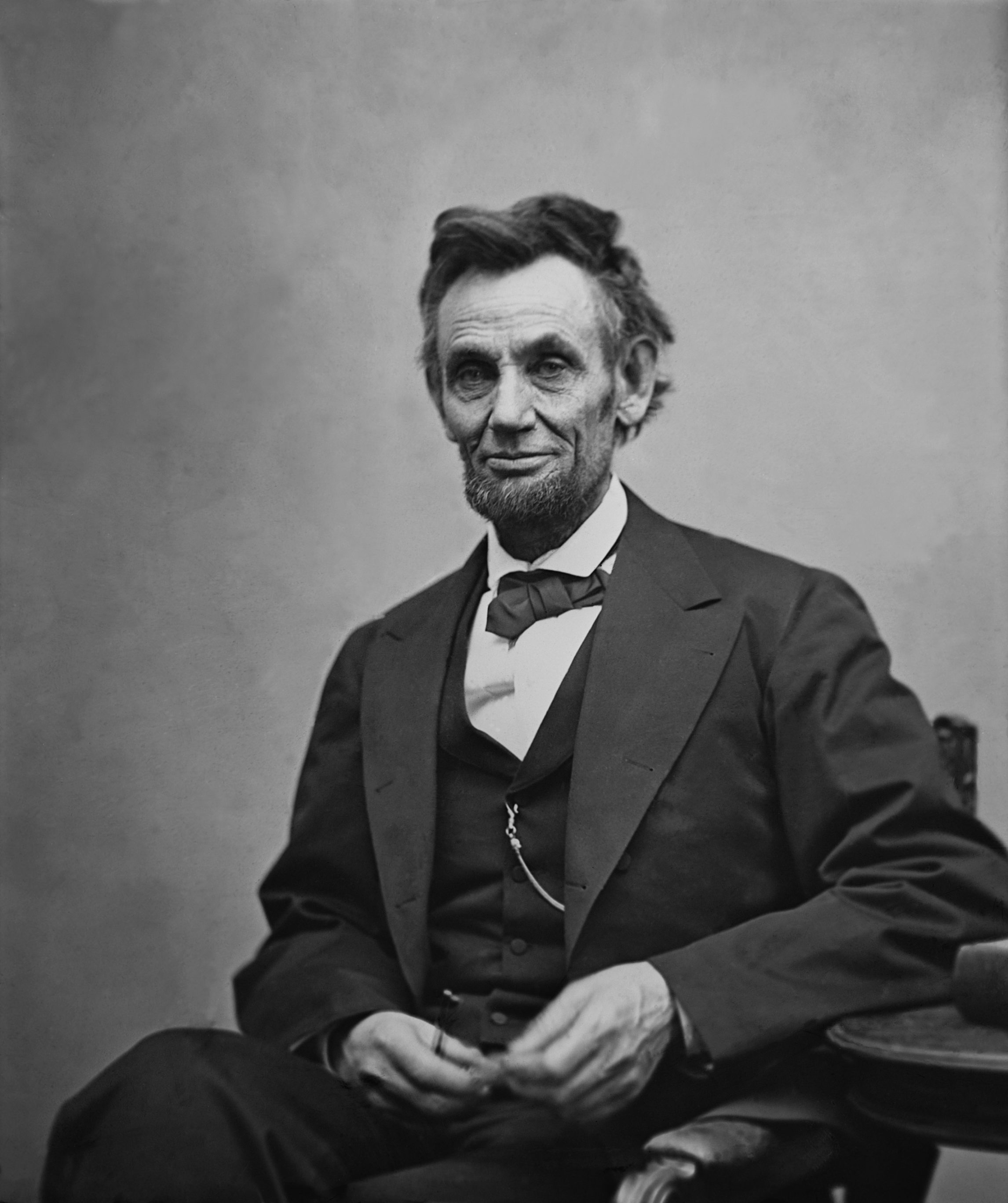
| Abraham Lincoln | Information |
|---|---|
| Full Name | Abraham Lincoln |
| Birthdate | February 12, 1809 |
| Birthplace | Hodgenville, Kentucky, U.S. |
| Education | Self-educated |
| Occupation | Lawyer, politician, statesman |
| Political Party | Republican (after 1856), Whig (before 1856) |
| Presidency | 16th President of the United States (1861-1865) |
| Significant Achievements | Led the Union during the American Civil War |
| Notable Positions | U.S. Congressman from Illinois |
| Height | 6 ft 4 in (193 cm) |
| Spouse | Mary Todd (married in 1842) |
| Children | Robert, Edward, Willie, Tad |
| Assassination | Fatally shot by Confederate sympathizer John Wilkes Booth on April 14, 1865 |
| Legacy | Remembered as a martyr and national hero for preserving the Union and abolishing slavery |
| Personal Background | Born into poverty in a log cabin on Sinking Spring Farm |
| Civil War Leadership | Mobilized forces to suppress the rebellion and restore the union |
In 1862, only a few short months before the start of the American Civil War, Abraham Lincoln was sworn in as the 16th President of the United States.
His excellent IQ of 148 demonstrated how admirable his self-education was. Abraham Lincoln could emerge from his meager beginnings and became an exceptional lawyer despite having little formal education. Thanks to his outstanding accomplishments, he is on the path to the president.
He was chosen by the majority of Americans in 1861. He subsequently worked to end slavery by issuing the Emancipation Proclamation. His Gettysburg Address was declared the most well-known presidential address in American history.
13. Franklin D. Roosevelt – The 32nd President Of The United States
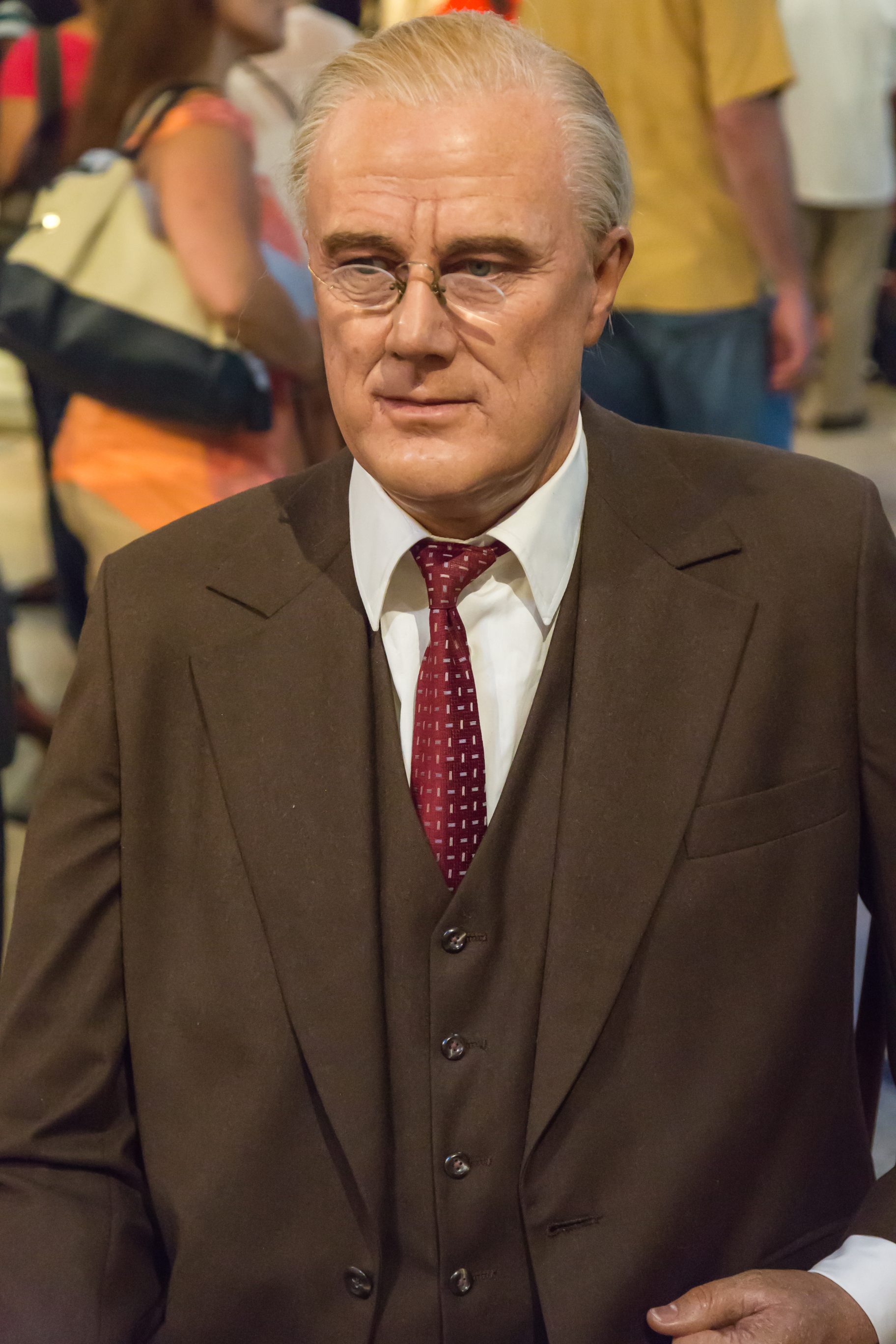
| Franklin D Roosevelt The 32nd President Of The United States | Information |
|---|---|
| Full Name | Franklin D. Roosevelt – The 32nd President Of The United States |
| Birthdate | January 30, 1882 |
| Birthplace | Hyde Park, New York, U.S. |
| Other Names | FDR |
| Alma Mater | Groton School, Harvard College, Columbia Law School |
| Political Party | Democratic |
| Occupations | Statesman, Politician, Lawyer |
| Notable Positions | 32nd President of the United States |
| Presidency Duration | March 4, 1933 – April 12, 1945 |
| Accomplishments | Implemented the New Deal, Led the U.S. through World War II |
| Legacy | Ranked as one of the greatest presidents in American history |
| Spouse | Eleanor Roosevelt (m. 1905) |
| Children | 6 (including Franklin Jr., Anna, Elliott, James II, and John II) |
| Parents | James Roosevelt I, Sara Delano |
| Physical Condition | Paralyzed from the waist down due to a paralytic illness |
| Death | April 12, 1945 (aged 63) |
| Resting Place | Springwood Estate |
| Controversies | Ordering the incarceration of Japanese Americans in concentration camps during World War II |
When Franklin D. Roosevelt took office, the United States was deep in the throes of the Great Depression. He became the 32nd President of the United States and served for a total of four terms, beginning in 1933 and ending in 1945.
Before joining the Democratic party and earning elected to the New York Senate in 1910, Roosevelt had degrees from Harvard and Columbia Law Schools. It is believed that his IQ is 146.
14. Millard Fillmore – The 13th President Of The United States
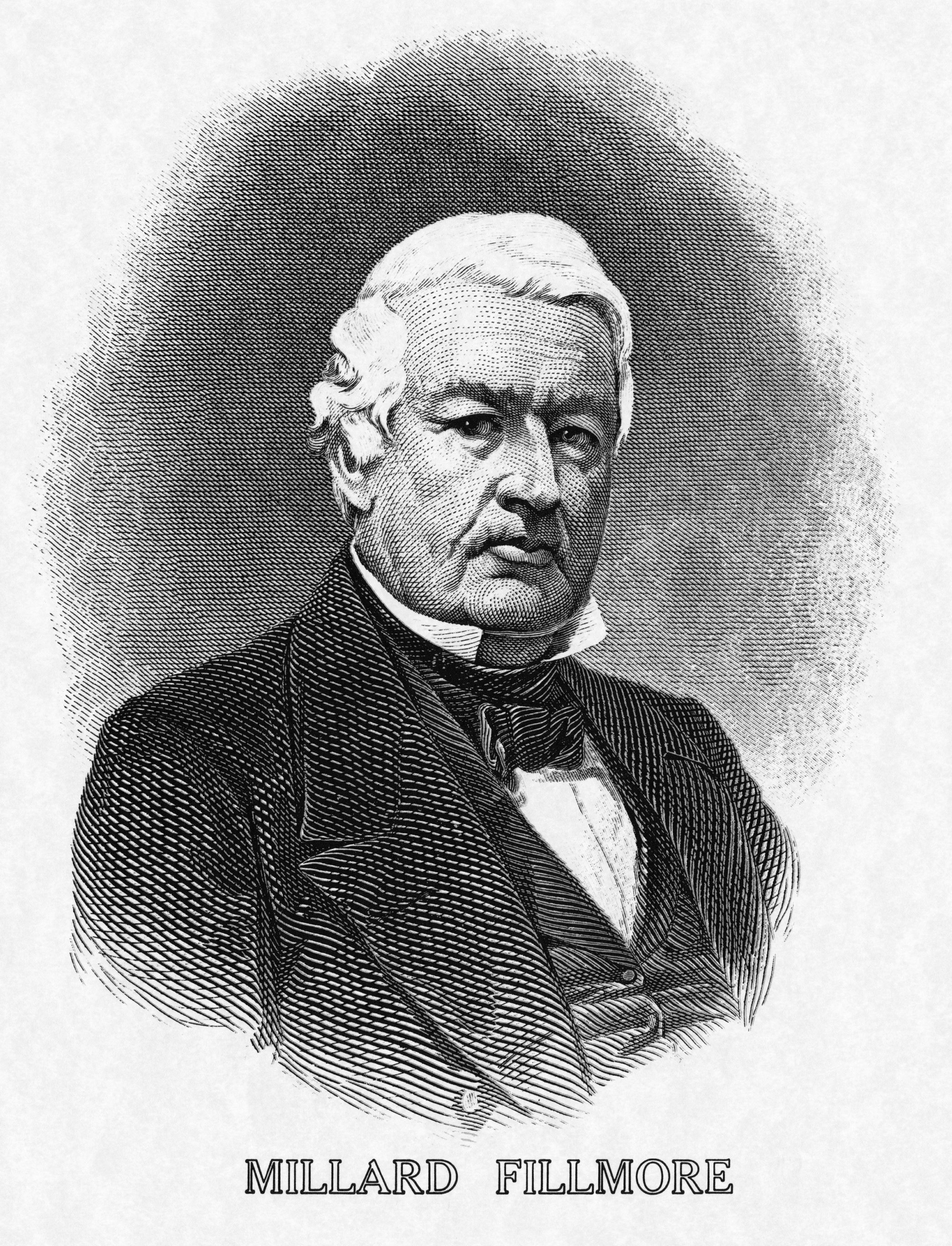
| Millard Fillmore The 13th President Of The United States | Information |
|---|---|
| Full Name | Millard Fillmore – The 13th President Of The United States |
| Birthdate | January 7, 1800 |
| Birthplace | Moravia, Cayuga County, New York, U.S. |
| Political Party | Anti-Masonic, Whig, Know Nothing, Democratic |
| Occupation | Politician, lawyer |
| Presidency | 13th President of the United States (1850-1853) |
| Vice Presidency | 12th Vice President of the United States (1849-1850) |
| Significant Role | Instrumental in passing the Compromise of 1850 |
| Notable Achievements | Chairman of the House Ways and Means Committee |
| Spouses | Abigail Powers (1826-1853), Caroline McIntosh (1858) |
| Children | Millard, Mary |
| Legacy | Historically ranked among the worst presidents due to policies regarding slavery |
Millard Fillmore served as the 13th and last president to have the Whig party nomination.
According to Simonton’s calculations, he had an intelligence level of 143 and exemplified the American ideal in its purest form. Fillmore was born in 1800 in a log cabin in the Finger Lakes region of New York. In 1823, he went on to become a lawyer, and not long after that, he was chosen to serve in the House of Representatives.
After Zachary Taylor’s untimely death, Fillmore was elevated to the position of president and served from 1850 until 1853.
15. John Tyler – The Tenth President Of The United States
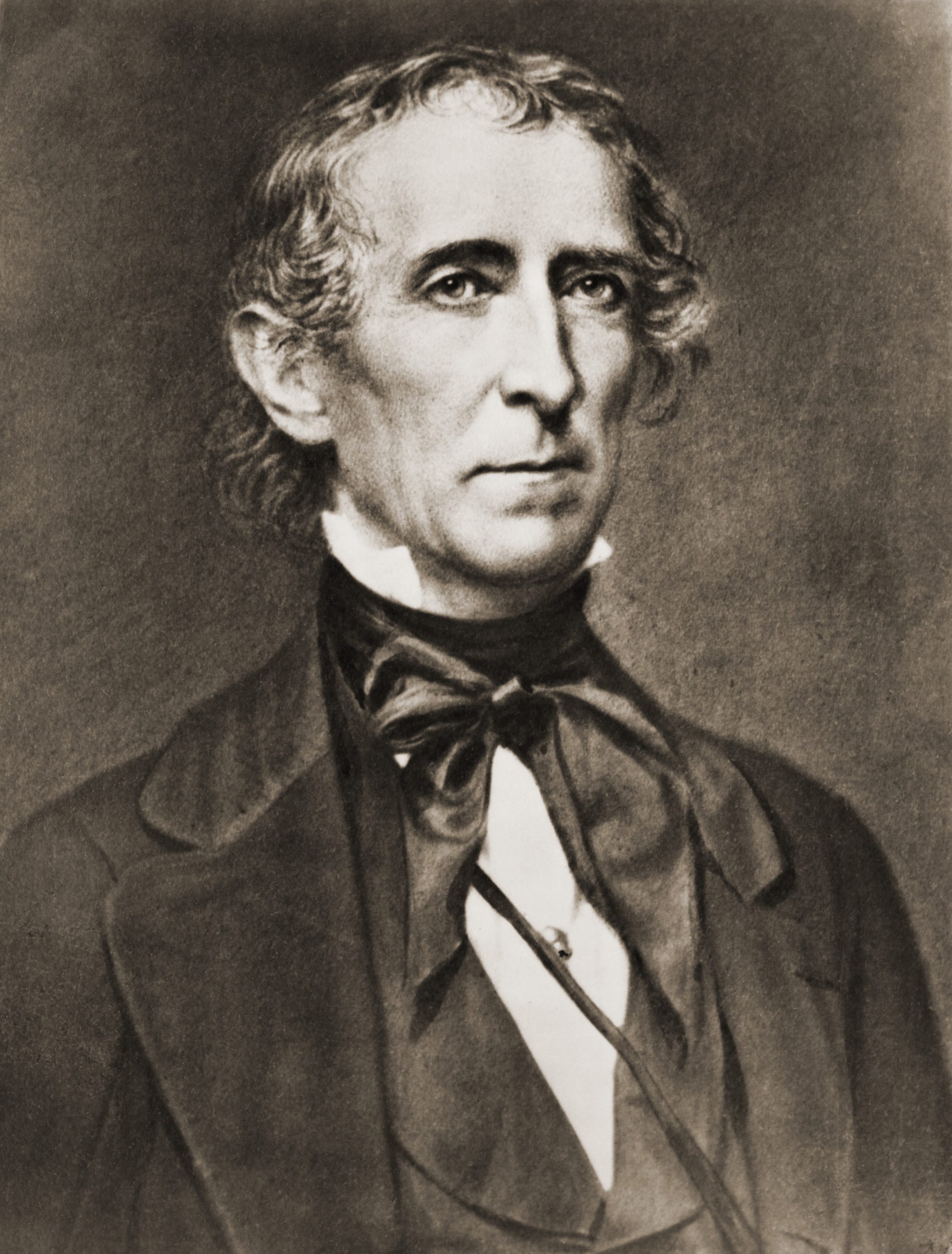
| John Tyler The Tenth President Of The United States | Information |
|---|---|
| Full Name | John Tyler – The Tenth President Of The United States |
| Portrait | Portrait by Mathew Brady, c. 1860-1862 |
| President | 10th President of the United States |
| Vice President | None |
| In Office | April 4, 1841 – March 4, 1845 |
| Political Party | Independent (1841–1844, 1844–1862) |
| Spouses | Letitia Christian (m. 1813; died 1842), Julia Gardiner (m. 1844) |
| Children | 15 |
| Birthdate | March 29, 1790 |
| Birthplace | Greenway Plantation, Charles City County, Virginia, U.S. |
| Alma Mater | College of William & Mary |
| Profession | Politician, lawyer |
| Military Service | Charles City Rifles (Virginia militia company) |
| Rank | Captain |
| Battles/Wars | War of 1812 |
| United States Senator from Virginia | March 4, 1827 – February 29, 1836 |
| Governor of Virginia | December 10, 1825 – March 4, 1827 |
| Member of the U.S. House of Representatives from Virginia’s 23rd district | December 17, 1816 – March 3, 1821 |
| President pro tempore of the United States Senate | March 3, 1835 – December 6, 1835 |
| Died | January 18, 1862 (aged 71) |
| Resting Place | Hollywood Cemetery, Richmond, Virginia, U.S. |
| Notable Achievements | – 10th President of the United States |
After William Henry Harrison, the previous president of the United States, passed away in April 1841, John Tyler became the 10th president of the United States.
Tyler received his legal education at the College of William & Mary, where he also attended. Even though he was believed to have had an IQ of 142, his contemporaries often failed to take him seriously since he was the first vice president to become president without being elected.
Despite the criticism he received, Tyler could get a lot of good legislation approved during his presidency, including a tariff measure designed to help northern manufacturing.
16. Franklin Pierce – The 14th President Of The United States
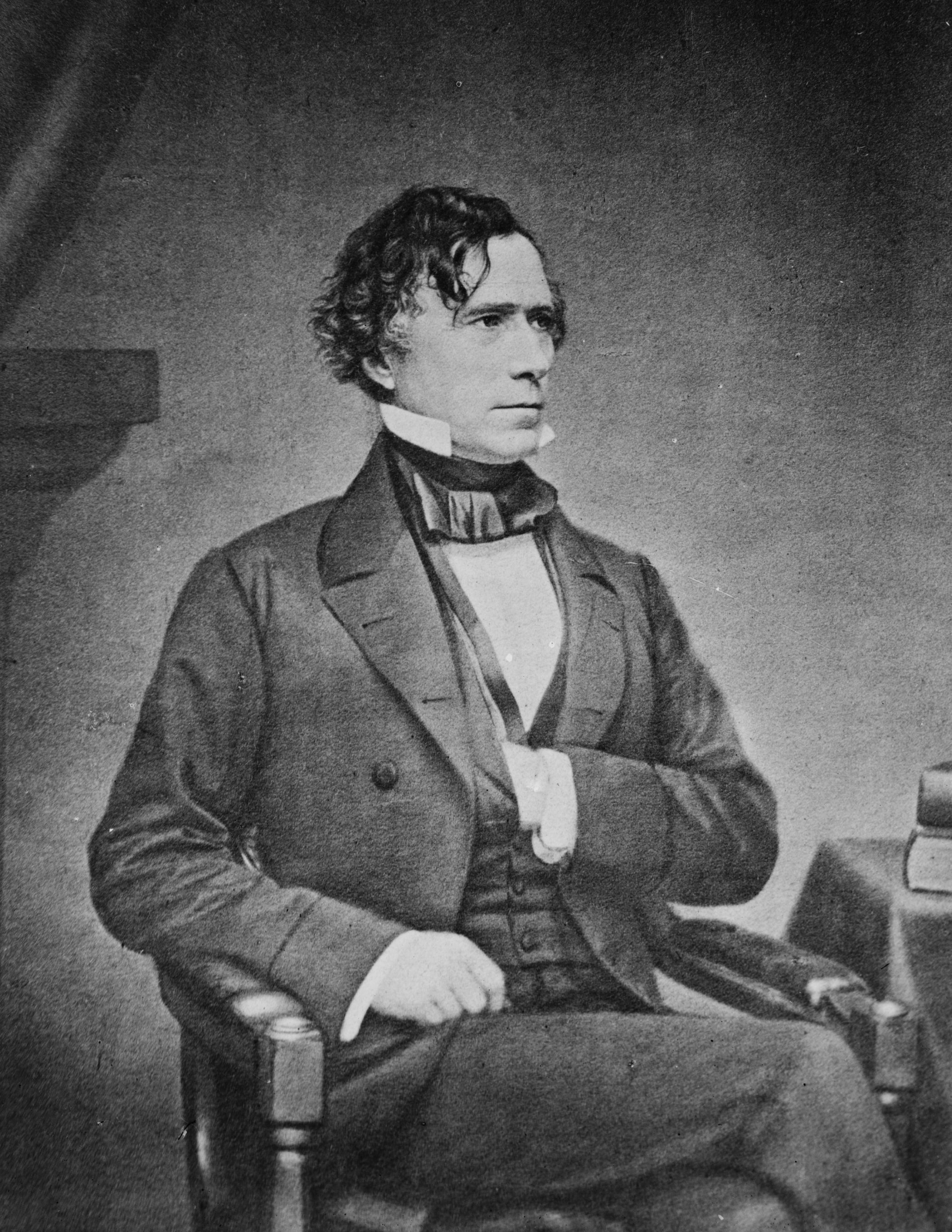
| Franklin Pierce The 14th President Of The United States | Information |
|---|---|
| Full Name | Franklin Pierce – The 14th President Of The United States |
| Portrait | Portrait by Mathew Brady, c. 1855–1865 |
| Term in Office | March 4, 1853 – March 4, 1857 |
| Vice President | William R. King, None |
| Preceded by | Millard Fillmore |
| Succeeded by | James Buchanan |
| Senator from | New Hampshire |
| Term in Senate | March 4, 1837 – February 28, 1842 |
| Member of the House | U.S. House of Representatives from New Hampshire’s at-large district |
| Term in House | March 4, 1833 – March 3, 1837 |
| Speaker of the House | New Hampshire House of Representatives |
| House Term | January 5, 1831 – January 2, 1833 |
| Member of the State | New Hampshire House of Representatives from Hillsborough |
| House Term | January 7, 1829 – January 2, 1833 |
| Born | November 23, 1804 |
| Birthplace | Hillsborough, New Hampshire, U.S. |
| Died | October 8, 1869 |
| Place of Death | Concord, New Hampshire, U.S. |
| Resting Place | Old North Cemetery, Concord, New Hampshire, U.S. |
| Political Party | Democratic |
| Spouse | Jane Appleton |
| Children | 3 |
| Parent | Benjamin Pierce (father) |
| Relative | Benjamin Kendrick Pierce (brother) |
| Education | Bowdoin College, Northampton Law School |
| Profession | Politician, lawyer |
| Military Service | New Hampshire Militia, United States Army |
| Years of Service | 1831–1847 (Militia), 1847–1848 (Army) |
| Wars/Battles | Mexican–American War, Battle of Contreras, Battle of Churubusco, Battle of Molino del Rey, Battle of Chapultepec, Battle for Mexico City |
| Contribution as President | Enforced the Fugitive Slave Act, signed the Kansas–Nebraska Act, signed the Gadsden Purchase, signed trade treaties with Britain and Japan |
| Historical Ranking | Generally considered one of the worst and least memorable U.S. presidents |
His presidency spanned 1853 to 1857, making Franklin Pierce the 14th president of the United States. According to Simonton’s calculations, Pierce had an intelligence level of 141.
Unfortunately, most historians rate him among the worst presidents in history.
Pierce attempted to improve governmental transparency and establish the framework for the construction of railways. Still, his accomplishments were overshadowed by less well-liked programs, such as the Kansas-Nebraska Act.
It gave new regions the freedom to choose whether to permit slavery or not. The legislation made the Civil War possible, which provoked violent clashes between settlers who supported and opposed slavery.
17. William Henry Harrison – The Ninth President Of The United States
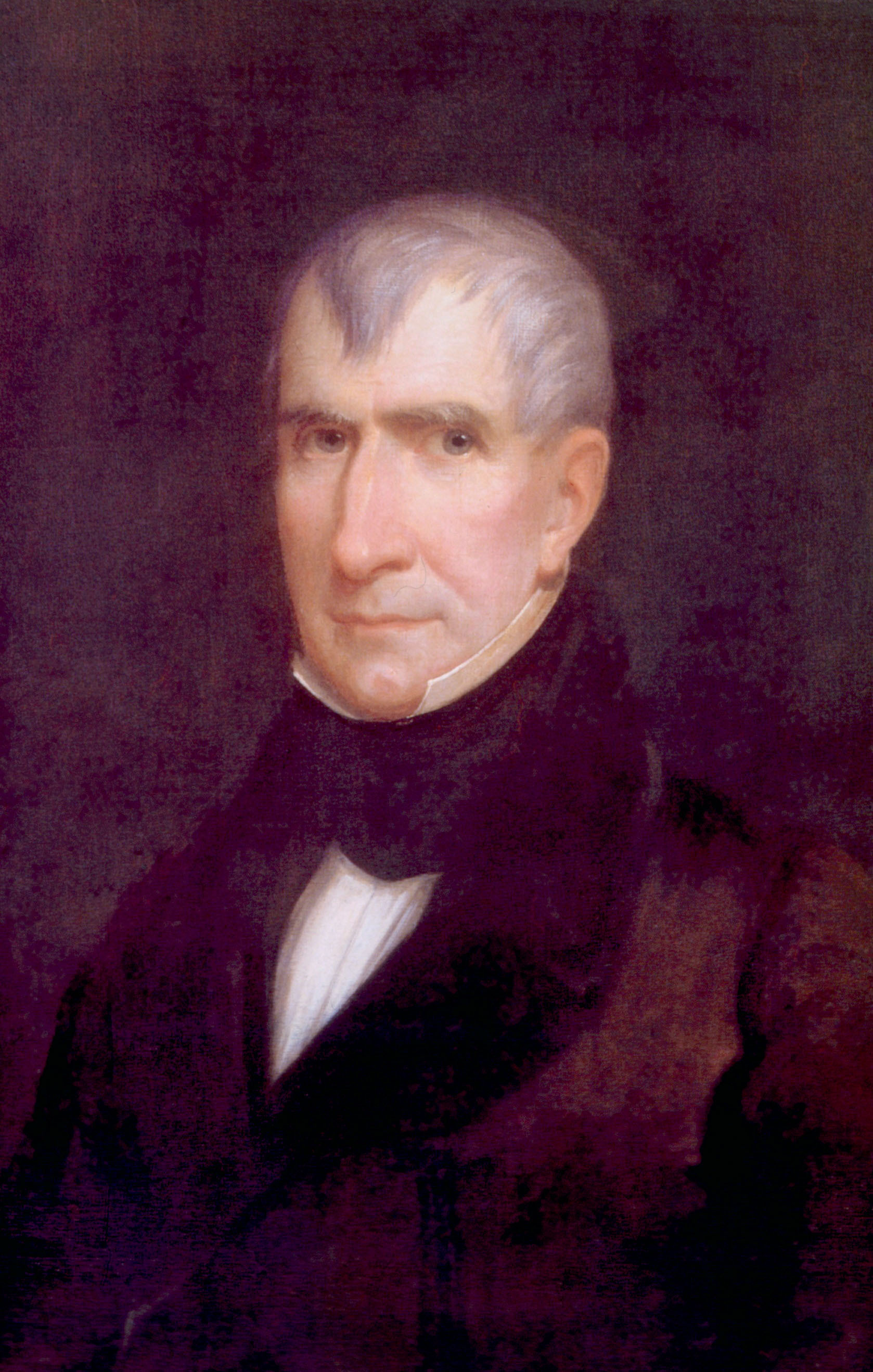
| William Henry Harrison The Ninth President Of The United States | Information |
|---|---|
| Full Name | William Henry Harrison – The Ninth President Of The United States |
| Birthdate | February 9, 1773 |
| Birthplace | Berkeley Plantation, Charles City County, Virginia, British America |
| Death | April 4, 1841 |
| Place of Death | Washington, District of Columbia, U.S. |
| Presidency | 9th President of the United States |
| Term in Office | March 4, 1841 – April 4, 1841 |
| Inauguration | March 4, 1841 |
| Shortest Presidency | His presidency lasted only 31 days, the shortest in U.S. history |
| Cause of Death | Pneumonia |
| First President to Die in Office | His death caused a brief constitutional crisis due to undefined presidential succession |
| Political Party | Democratic-Republican (before 1828), Whig (from 1836) |
| Spouse | Anna Symmes (m. 1795) |
| Children | 10, including John |
| Education | Hampden–Sydney College, University of Pennsylvania (medical studies, incomplete) |
| Military Service | United States Army |
| Rank | Major General |
| Battles/Wars | Northwest Indian War, Battle of Tippecanoe, War of 1812, Battle of the Thames |
| Nickname | “Old Tippecanoe” |
| Political Career | Secretary of the Northwest Territory, Governor of Indiana Territory |
| Contributions | Played a key role in the Battle of Fallen Timbers, signed the Treaty of Greenville, led troops to victory at the Battle of the Thames |
| Lasting Legacy | Remembered for his Indian policies and campaign tactics |
| Family | Son of Benjamin Harrison V, paternal grandfather of Benjamin Harrison (23rd President) |
Being the seventh and last child in his family meant that William Henry Harrison only received a little fortune. To make his mark on the world, he decided to depend on his skills and intelligence rather than his resources and sought a military career. The estimate for his IQ is 134.
He embraced politics after finding victory in combat, becoming Indiana’s first governor. As the ninth president, he was chosen (1841). Harrison became ill soon after being sworn in, and the cold he had ended up dying from. He held office for the shortest period in presidency history, only 30 days, 12 hours, and 30 minutes.
18. Rutherford B. Hayes – The 19th President Of The United States
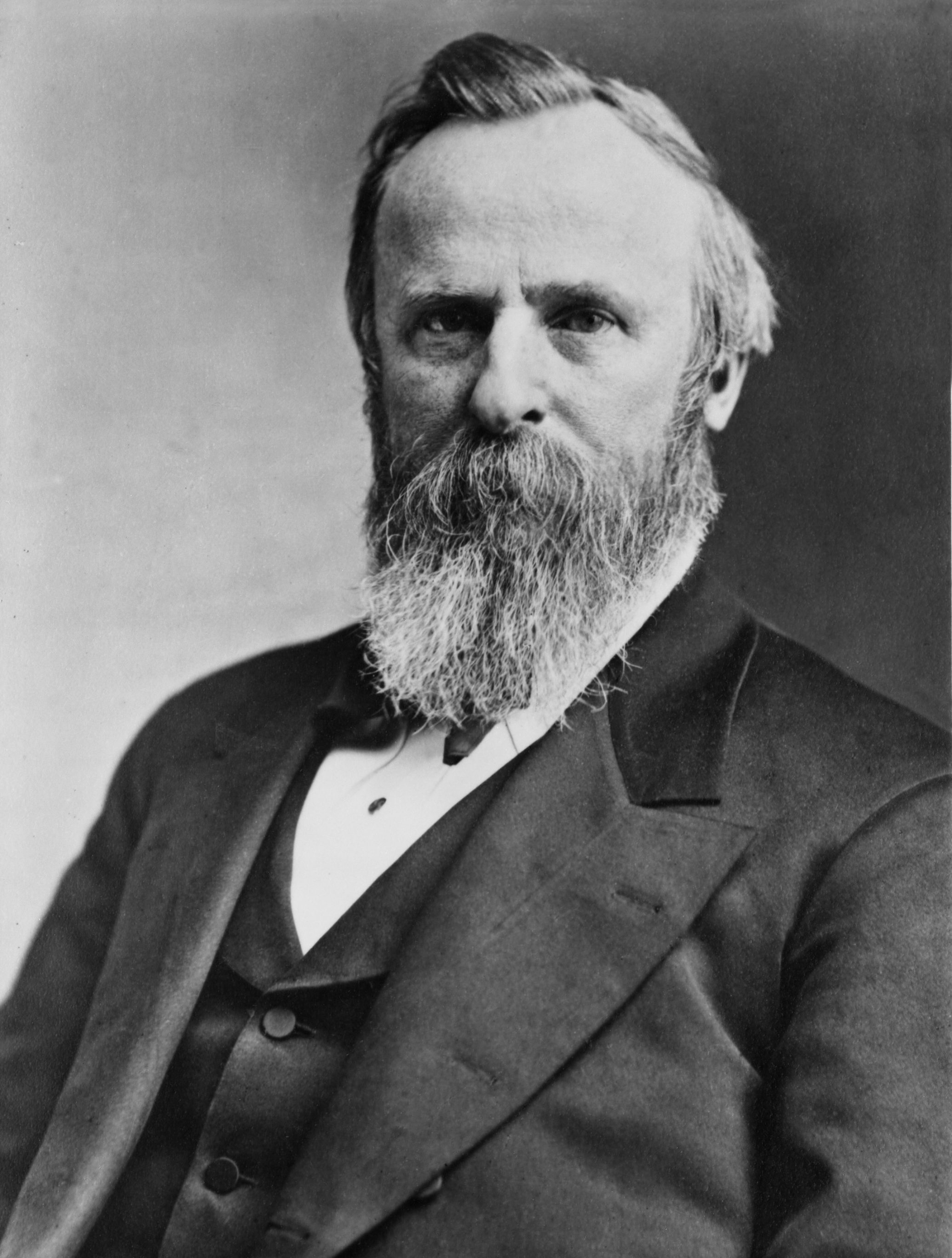
| Rutherford B Hayes The 19th President Of The United States | Information |
|---|---|
| Full Name | Rutherford B. Hayes – The 19th President Of The United States |
| Birthdate | October 4, 1822 |
| Birthplace | Delaware, Ohio, U.S. |
| Political Party | Whig (until 1854), Republican (from 1854) |
| Education | Kenyon College (BA), Harvard Law School (LL.B) |
| Occupation | Lawyer, Politician |
| Military Service | Union Army (USV) |
| Presidency | March 4, 1877 – March 4, 1881 |
| Spouse | Lucy Ware Webb (m. 1852; died 1889) |
| Children | 3 sons: Birchard Austin, Webb Cook, and Rutherford Platt |
| Vice President | William A. Wheeler |
| Governor of Ohio | 29th and 32nd |
| U.S. House of Representatives | Member from Ohio’s 2nd district |
| Notable Actions | Ended federal support for Reconstruction and military occupation |
| Rank | Brigadier General, Major General (brevet) |
| Battles | American Civil War, Battle of South Mountain (WIA), Battle of Cloyd’s Mountain, Valley Campaigns of 1864 |
| Resting Place | Spiegel Grove State Park |
| Historical Ranking | Average to below-average president |
The future 19th president (1877–1881) worked at a legal firm for over a year before enrolling in Harvard’s law school. As a staunch advocate for equality, Rutherford B. Hayes represented fugitive slaves in court. Some may categorize him as an idealist. His IQ is thought to be 134.
As president, he attempted to resolve unresolved issues from the Civil War and Reconstruction while promoting civil service reform. Despite his best efforts, Hayes could not peacefully resolve racial tensions in society and politics.
19. George Washington – The First President Of The United States

| George Washington The First President Of The United States | Information |
|---|---|
| Full Name | George Washington – The First President Of The United States |
| Birthdate | February 22, 1732 |
| Birthplace | Popes Creek, Virginia Colony, British America |
| Occupation | Military Officer, Statesman, Founding Father |
| Presidency | 1st President of the United States (1789-1797) |
| Military Service | Commander of the Continental Army |
| Political Party | Independent |
| Role in the American Revolution | Led Patriot forces to victory |
| Contributions | President of the Constitutional Convention |
| Notable Achievements | “Father of his Country” |
| Leadership | Founding the United States of America |
| Significant Actions | Implementation of a strong national government |
| Legacy | Memorials, federal holiday, State of Washington |
| Education | Self-taught, skilled in mathematics and surveying |
| Family Background | Washington family, wealthy Virginia planters |
| Relationship with Slavery | Owned slaves, complex stance |
| Religious Affiliation | Member of the Anglican Church |
| Lasting Precedents | Use of the title “Mr. President,” Farewell Address |
| Historical Ranking | Among the greatest U.S. presidents |
The renowned first president of the United States (1789–1797) received an IQ rating that was close to the average. Washington hardly completed elementary school, yet he serves as an example of how someone with less formal education can still make their mark on history. It is believed that he has a 132 IQ.
He served in the colonial military for six years during the deadly and chaotic French and Indian War. George Washington saw the necessity for a powerful federal government after military victories and numerous unsuccessful wars.
20. Richard Nixon – The 37th President Of The United States
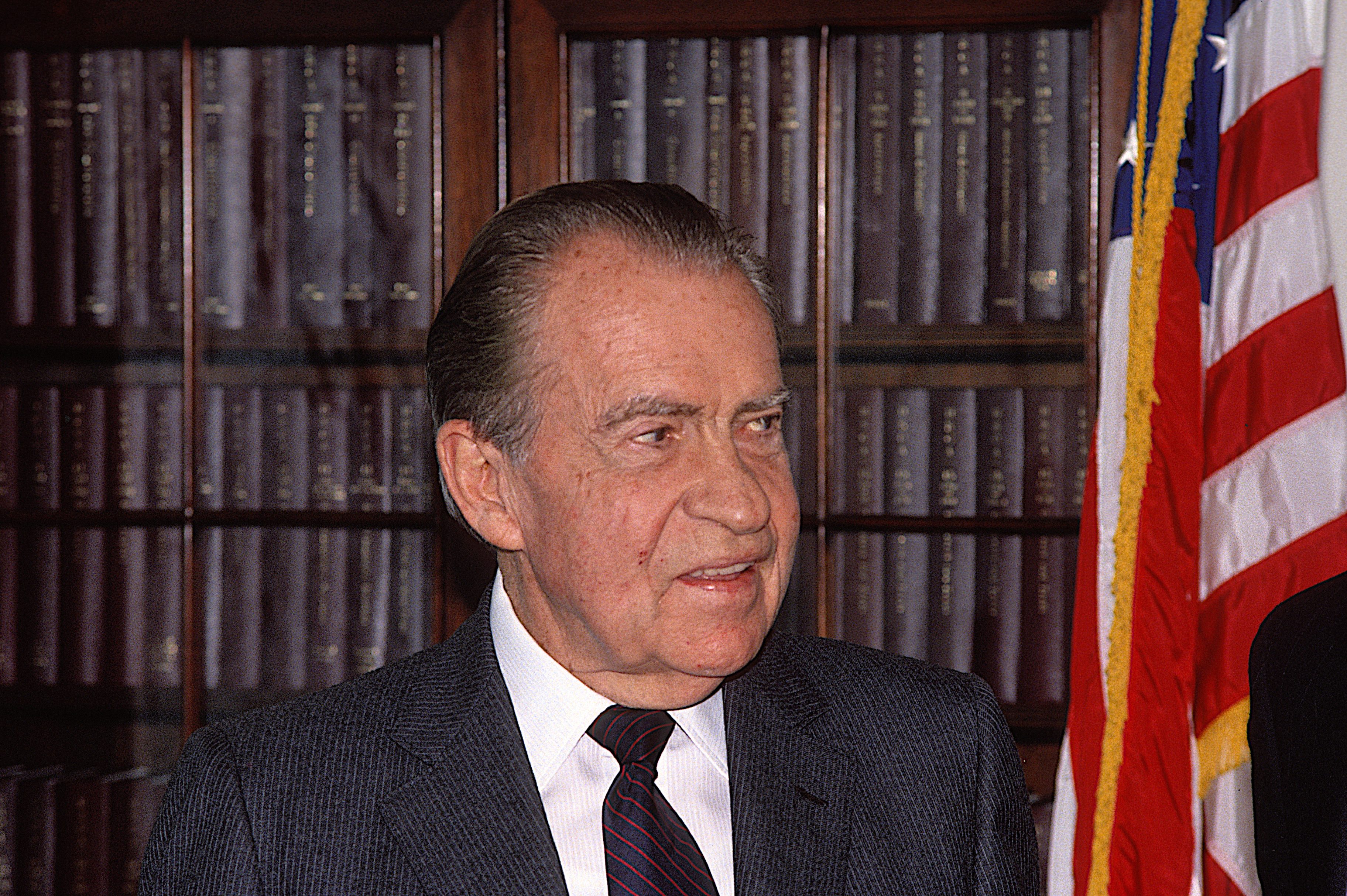
| Richard Nixon The 37th President Of The United States | Information |
|---|---|
| Full Name | Richard Nixon – The 37th President Of The United States |
| Birthdate | January 9, 1913 |
| Birthplace | Yorba Linda, California, U.S. |
| Political Party | Republican |
| Education | Whittier College (BA) Duke University (LLB) |
| Occupation | Politician Lawyer Author |
| Presidency | 37th President of the United States (1969-1974) |
| Notable Achievements | – Reduced U.S. involvement in the Vietnam War – Détente with the Soviet Union and China – Apollo 11 Moon landings – Established the Environmental Protection Agency (EPA) – Established the Occupational Safety and Health Administration (OSHA) – Implemented the Controlled Substances Act – Pushed for the Clean Water and Clean Air Acts – Enforced the desegregation of Southern schools – Improved relations with Native Americans and rescinded the termination policy – Lowered the voting age from 21 to 18 with the 26th Amendment – Signed the Anti-Ballistic Missile Treaty with the Soviet Union – Ended American involvement in Vietnam combat and the military draft |
| Scandal and Resignation | Resigned from office on August 9, 1974, due to the Watergate scandal |
| Legacy | – Historians and political scientists rank Nixon as a below-average president – Evaluations of his presidency are complex, considering both his successes and the circumstances of his departure from office |
During his time at school, the man who would serve as the 37th President of the United States (1969–1974) was an outstanding student. Richard Nixon achieved outstanding grades and excelled in a variety of extracurricular activities. A score of 131 is assigned to his intelligence level.
Nixon made two separate runs for the presidency, the second of which he was victorious.
His life was supposed to be a narrative of tenacity and intellectual triumphs, including significant advances in international relations, but a scandal eclipsed all else he had accomplished. Only President Richard Nixon has ever resigned from office under such circumstances.
